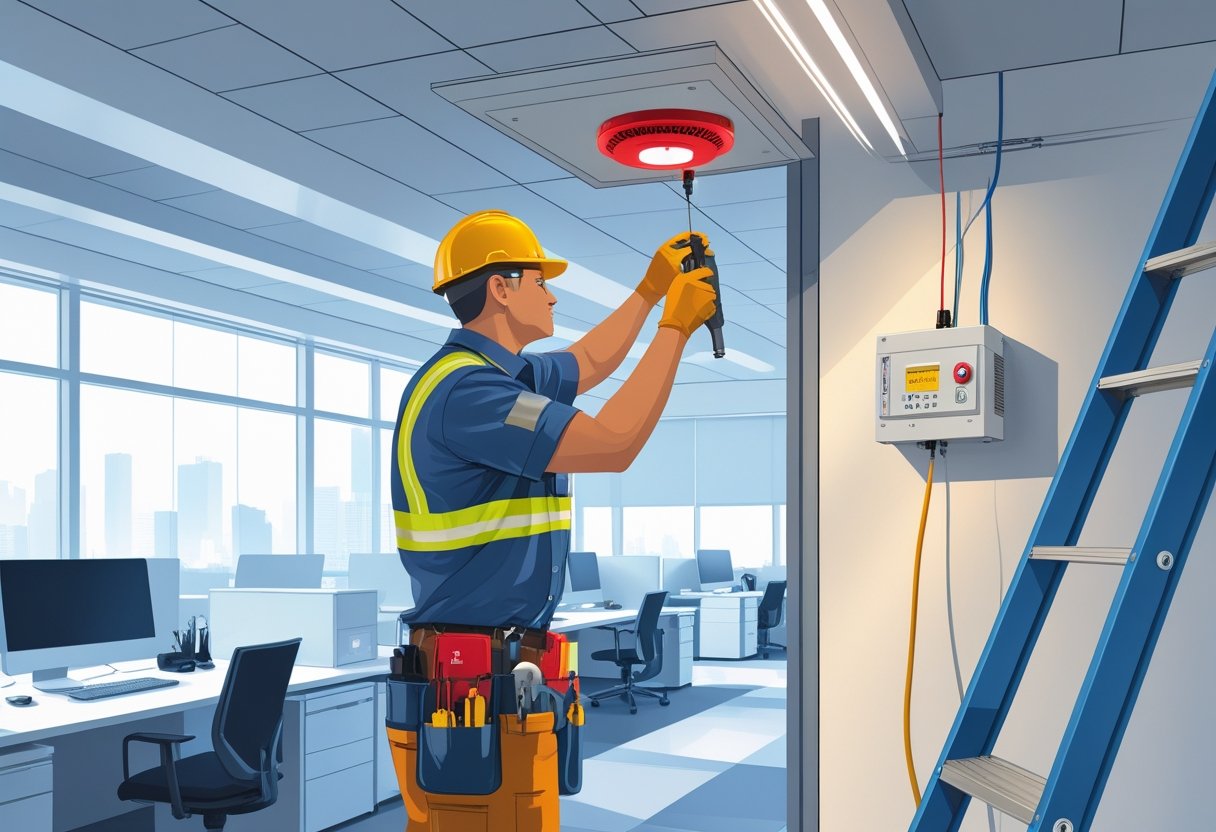When it comes to protecting your business, ensuring you have a reliable fire alarm system is crucial. For those looking for commercial fire alarm installation near you in the greater Houston area, there are experienced providers ready to help design and install a system that meets your specific needs. These professionals understand local regulations and can guide you through the complexities of fire safety compliance.
Time is of the essence when it comes to fire protection. By choosing local experts for your fire alarm installation, you gain access to tailored service that is responsive and quick. Whether you are starting a new construction project or upgrading an existing system, the right team will ensure that all safety requirements are met effectively.
Selecting a service that operates in your region means you benefit from their intimate knowledge of local codes and the common challenges faced by businesses in the area. This localized expertise can help safeguard your property and personnel from potential fire hazards.
Understanding Commercial Fire Alarm Installation
When considering commercial fire alarm installation, it is vital to understand the specifics of system components and compliance requirements. These aspects ensure not only safety but also adherence to local regulations.
What Is Commercial Fire Alarm Installation?
Commercial fire alarm installation refers to the process of setting up an integrated fire detection system designed for business environments. This system typically includes various devices such as smoke detectors, heat sensors, alarm notifications, and control panels.
Professional installation includes assessing your property to customize the system, ensuring it meets local fire codes and safety standards. Technicians work to identify optimal locations for mounting detectors and alarms, taking into account building layout and occupancy patterns.
Fire Alarm System Components
A comprehensive fire alarm system consists of several key components:
- Control Panel: The brain of the system, monitoring inputs and activating alarms.
- Smoke Detectors: Senses smoke and alerts the system.
- Heat Detectors: Activates when a specific temperature is reached.
- Manual Pull Stations: Allows occupants to manually trigger alarms.
- Notification Devices: Include horns, strobe lights, or voice alarms to alert individuals of fire incidents.
Each component must be chosen based on the unique needs of your facility while adhering to local codes, especially in the greater Houston area where specific regulations apply.
Fire Safety Requirements for Businesses
Businesses have a responsibility to comply with fire safety regulations to protect employees and assets. Your fire alarm system must meet the standards set by authorities, including the National Fire Protection Association (NFPA) and local codes, which may differ.
It's essential to conduct regular inspections and maintenance checks once the system is installed. This includes testing alarm functions, replacing batteries, and ensuring all components are operational. Additionally, employee training on fire safety protocols is crucial to enhance overall preparedness in the event of an emergency.
Types of Fire Alarm Systems and Equipment
Understanding the different types of fire alarm systems and equipment is essential for effective fire safety in your commercial property. This knowledge helps you select the right system that meets your specific needs while ensuring compliance with local regulations.
Conventional Versus Addressable Systems
Conventional fire alarm systems are divided into zones, allowing you to identify which area has an alarm. This system is often more budget-friendly but less precise. In contrast, addressable systems assign a unique identifier to each device. This level of detail enables you to pinpoint the exact location of an activated device.
Advantages of Addressable Systems:
- Accuracy: Quickly identify the specific device causing the alarm.
- Flexibility: Easier to expand as your needs grow.
When to Choose Conventional:
- Smaller installations or tighter budgets.
Initiating Devices and Detectors
Initiating devices are the first line of defense in fire alarm systems. They detect smoke, heat, or flames and trigger the alarm. Common types include smoke detectors, heat detectors, and manual pull stations.
Types of Initiating Devices:
- Smoke Detectors: Use photoelectric or ionization technology.
- Heat Detectors: Trigger alarms based on a rise in temperature.
- Manual Pull Stations: Allow occupants to alert authorities quickly.
Selecting the right combination of detectors is crucial for comprehensive coverage in your commercial space.
Control Panels and Notification Appliances
Control panels serve as the brain of a fire alarm system, connecting initiating devices and notification appliances. They process signals from detectors and manage alarm notifications.
Key Features of Control Panels:
- User Interface: Provides alerts and system status.
- Integration: Works with other safety systems like sprinklers.
Notification appliances, including horns, strobe lights, and speakers, ensure that occupants receive alerts promptly.
Important Points:
- Notification systems should be loud enough to be heard over ambient noise.
- Visual alerts are vital for individuals with hearing impairments.
Selecting appropriate control panels and notification appliances will enhance overall safety and compliance with local fire codes in the greater Houston area.
Steps in the Commercial Fire Alarm Installation Process
Installing a commercial fire alarm system involves several critical steps that ensure safety and compliance. Each phase is essential for tailoring a system that suits your building's specific needs while adhering to regulations.
Site Assessment and System Design
Before installation, conduct a thorough site assessment. This involves evaluating the layout of your building, identifying potential fire hazards, and determining optimal locations for devices.
Key components of the assessment include:
- Identifying high-risk areas: Focus on kitchens, storage rooms, and electrical closets.
- Assessing building layout: Understand how smoke and heat will travel within your space.
- Choosing the right equipment: Select between hard-wired or addressable fire alarm systems based on your needs.
This initial step allows professionals to create a custom design that meets your specific requirements while enhancing safety measures.
Installation Best Practices
Proper installation of fire alarm equipment is imperative for functionality. Hire certified professionals for the job to ensure expertise in electrical systems and compliance with local building codes.
Consider these best practices:
- Correct placement of sensors: Install smoke and heat detectors in strategic locations, ensuring coverage throughout the facility.
- Wiring standards: Follow national and local codes for wiring to facilitate reliable communication between devices.
- Testing and verification: After installation, conduct thorough testing to confirm that all components function properly.
Adhering to these practices minimizes false alarms and maximizes effectiveness.
Code Compliance and Inspections
Compliance with safety codes and regulations is non-negotiable. Engaging with local authorities during installation ensures that your system meets legal requirements.
Inspection points include:
- Review of plans and designs: Submit your fire alarm system plans for approval before beginning work.
- Final inspections: After installation, schedule an inspection with local fire authorities to validate compliance.
- Ongoing maintenance checks: Regular inspections and maintenance of your fire alarm system are necessary to uphold compliance and performance.
By focusing on code compliance, you protect your business and maintain peace of mind regarding fire safety.
Essential Fire Alarm Services for Commercial Properties
For businesses in the greater Houston area, implementing essential fire alarm services is crucial. These services, including testing, inspection, maintenance, and repairs, ensure your fire alarm systems operate effectively, providing safety and compliance with local regulations.
Testing and Inspection
Regular testing and inspection of fire alarm systems are vital to ensure functionality. This involves checking alarm devices for responsiveness and verifying that control panels communicate properly.
You should schedule inspections at least annually, as local fire codes often mandate it. Inspections help identify potential issues before they escalate, ensuring timely repairs and compliance.
During testing, technicians will check smoke detectors, alarm signals, and visual indicators. Documenting these inspections provides proof of compliance in case of audits or emergencies.
Maintenance and Repairs
Ongoing maintenance of your fire alarm system is essential for reliability. This includes cleaning smoke detectors and reviewing battery backups to ensure uninterrupted operation.
In the event of a malfunction, prompt repairs are critical. A quick response minimizes downtime and potential risks. You should work with licensed professionals who offer 24/7 emergency services for urgent repair needs.
Regular maintenance not only prolongs the lifespan of your fire alarm equipment but also helps keep your facility compliant with safety standards. You can trust that a well-maintained system contributes significantly to workplace safety.
Choosing a Reliable Commercial Fire Alarm Installer Near You
Selecting a trustworthy commercial fire alarm installer is crucial for ensuring the safety of your business. You need to consider their qualifications, the range of services they provide, and their local support capabilities. The right installer will not only meet compliance standards but also offer ongoing maintenance and support.
Qualifications and Certifications
When evaluating potential fire alarm services, check for necessary qualifications and certifications. Installers should hold licenses specific to fire safety systems, ensuring they have met the required training criteria. Look for National Institute for Certification in Engineering Technologies (NICET) certifications, which validate technical skills related to fire alarm systems.
Additionally, confirm they are knowledgeable about local fire codes and regulations specific to the greater Houston area. This ensures your system will meet all compliance requirements, safeguarding your business from potential legal issues.
Evaluating Service Providers
To choose the best service provider, assess their experience and reputation in the industry. Look for reviews and testimonials from previous clients to gauge their reliability. A solid track record indicates they provide effective fire alarm installation and maintenance services.
Ask about the range of services offered, including installation, testing, and ongoing maintenance. A good installer should provide comprehensive support, including emergency services and regular inspections.
Also, inquire if they offer customized solutions tailored to your specific needs and industry type, ensuring your fire alarm systems are fully effective.
Local Support and Service Coverage
Selecting a local installer has its advantages. A provider based in the greater Houston area will offer more accessible support. Their proximity allows for quicker response times for maintenance and emergency services, which is essential for fire alarm systems.
Ensure your chosen installer has the capacity to service the specific needs of your facility. They should provide you with a clear understanding of their coverage area and service capabilities. This local focus will enhance your fire safety and operational efficiency, as they are more familiar with regional fire safety standards and requirements.
Frequently Asked Questions
When considering a commercial fire alarm installation, understanding the pertinent questions can help you make informed decisions. Below are common queries related to installation, inspection, and compliance for fire alarm systems specifically in the greater Houston area.
What are the legal requirements for installing a commercial fire alarm system?
Legal requirements for fire alarm installation can vary based on occupancy type and local codes. In Houston, compliance with the National Fire Protection Association (NFPA) standards and local building codes is essential. You may need to consult with local authorities to ensure all regulations are met.
How often should a commercial fire alarm system be inspected and tested?
The NFPA 72 recommends annual inspections for commercial fire alarm systems, along with monthly visual checks. Testing of the entire system should occur at least once a year to ensure functionality. Frequent checks help maintain compliance and safeguard your facility.
What is the average cost of installing a commercial fire alarm system?
The cost of installation can vary widely based on the size of your facility and the complexity of the system. On average, businesses in the greater Houston area may expect to spend between $1,000 to $5,000 for installation, including equipment and labor. Obtaining multiple quotes can provide a clearer picture.
Can I upgrade my existing commercial fire alarm system, or do I need a complete new installation?
Upgrading an existing commercial fire alarm system is often possible, depending on the age and technology of your current system. In many cases, adding newer components or integrated technologies can enhance functionality without requiring a complete replacement. Consult with a fire safety professional for tailored recommendations.
What is the difference between ionization and photoelectric smoke detectors for commercial use?
Ionization smoke detectors are more sensitive to fast-burning fires, while photoelectric smoke detectors are better at detecting slow, smoldering fires. Depending on your commercial setting, a combination of both types may provide the most effective fire detection. Assessing the specific needs of your facility will guide your choice.
How can I ensure my commercial fire alarm system complies with local fire safety regulations?
To ensure compliance, familiarize yourself with the local fire codes and regulations governing commercial fire alarm systems in Houston. Work closely with certified professionals during installation and maintenance. Regular inspections and adhering to testing schedules will further support compliance efforts.
.svg)



.svg)


.svg)



